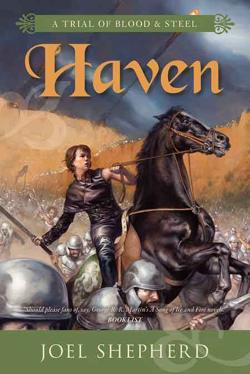Haven is the fourth and final book in Joel Shepherd’s excellent A Trial of Blood and Steel fantasy series. If you’re not familiar with the series yet, please take a look at my post about the first three novels here. If an excellent fantasy series that’s low on magic and high on morally ambiguous characters and complex politics in the vein of George R.R. Martin’s A Song of Ice and Fire (to which this series has been compared by many reviewers) sounds good to you, I highly recommend checking out series opener Sasha, because these books are almost criminally under-read.
The first thing that struck me about Haven is that it doesn’t feel like a brand new chapter in the series as much as the previous books in A Trial of Blood and Steel did. Sasha, Petrodor, and Tracato all have their own distinct identity: they’re each set in a different part of the continent of Rhodia, there are short gaps between them, and they offer strong individual sub-plots while at the same time gradually building the overall story arc. Haven, by contrast, starts out as a more or less direct continuation of Tracato, to the point where the two books could almost have been presented as two parts of the same novel. It’s understandable that, after ratcheting up the tension during the previous three books, the author would want to keep the lens focused on the Verenthanes’ efforts to “liberate” the Saalshen Bakosh, but there’s so much unexplored territory left on the books’ maps (e.g. the Lisan Empire and Cherrovan) that I was hoping the scope of the story would broaden again. Then again, we do get some neat looks at life among the serrin and at the border city of Jhand (“Haven” in one of the story’s languages), which is a city shared by serrin and humans. And—fingers crossed—maybe in the future there will be more novels set in the same world….
Because Haven is the final book in a series, it’s hard to give many plot details without including spoilers for the previous novels, so this will be intentionally vague. In a nutshell, the book shows the progression and final culmination of Sasha’s attempts to balance her strong personality, her sense of duty and honor, and her family background with the larger conflict between the serrin on the one hand and certain factions of humanity on the other. Important side-characters like Kessligh, Jaryd and Sofy continue to grow and become more complex. Newer ones like the Isfayens Markan and Jasmyn, who were both present in Tracato but become more important in Haven, are intriguing enough to make me wish there were more books coming in the series. The religious and political situation on the continent grows in complexity and moral ambiguity, presenting many different shades of grey—although by now it’s becoming harder and harder to find anything positive in some of the players.
In some ways, Haven is as strong as the previous installments in A Trial of Blood and Steel, but depending on exactly how high your expectations were, you may—like me—still feel ever so slightly disappointed. In retrospect, this series has been getting better with every book, up to now. Tracato was definitely the high point for me, because it was such a near-constant onslaught of the most gruelling personal decisions and thrilling battles. Compared with this level of intensity, several parts of Haven are almost tame. The novel also feels a bit scattered early on as it tries to keep its various story threads running, and because of this, it doesn’t have as much tension as the previous books. Subjective as this may sound, Haven just didn’t grab me from the start the same way Tracato did.
A few other minor quibbles: medieval warfare buffs will probably disagree with me here, but I feel that Haven occasionally spends too much time on the highly in-depth tactical discussions about troop dispositions and so on before the (many) battles. The series as a whole has featured some of the most exciting, edge-of-your-seat descriptions of both smaller fights and large scale warfare, but this time there’s much more focus on the pre-battlefield planning stages, which gets a bit tedious at times. And finally, after all the careful buildup of tension throughout the series, the ending of the novel somehow feels rushed, both in the way it resolves the series’ overall conflict and in the epilogue-like “what happened to everyone afterward” final chapter.
Then again, keep in mind that I’m comparing Haven to Tracato, one of the most intense fantasy novels I’ve read in years, so if Haven is maybe a little less excellent than its predecessor, it’s still a good conclusion to a great series and more than worth your time. Taken all together, A Trial of Blood and Steel is an amazing fantasy series that should have a much wider readership than it currently does. Based on the strength of this series and his previous Cassandra Kresnov SF novels, I can’t wait to read whatever Joel Shepherd decides to write next.
Stefan Raets is a reviewer for Fantasy Literature. He lives in San Diego.










